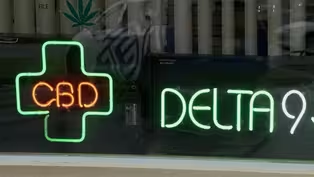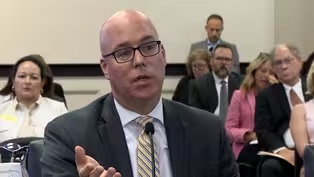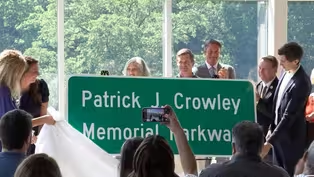
Celebrating Appalachia Through Seed Swap
Clip: Season 4 Episode 22 | 4m 35sVideo has Closed Captions
The Appalachian Heirloom Seed Swap is a yearly tradition in Pikeville.
After a flash flood in 2010, a group in Pike County took action to protect and celebrate a precious resource in Eastern Kentucky. The Appalachian Heirloom Seed Swap is a yearly tradition in Pikeville that organizers say is not just a celebration of seeds but of Appalachia itself.
Problems playing video? | Closed Captioning Feedback
Problems playing video? | Closed Captioning Feedback
Kentucky Edition is a local public television program presented by KET

Celebrating Appalachia Through Seed Swap
Clip: Season 4 Episode 22 | 4m 35sVideo has Closed Captions
After a flash flood in 2010, a group in Pike County took action to protect and celebrate a precious resource in Eastern Kentucky. The Appalachian Heirloom Seed Swap is a yearly tradition in Pikeville that organizers say is not just a celebration of seeds but of Appalachia itself.
Problems playing video? | Closed Captioning Feedback
How to Watch Kentucky Edition
Kentucky Edition is available to stream on pbs.org and the free PBS App, available on iPhone, Apple TV, Android TV, Android smartphones, Amazon Fire TV, Amazon Fire Tablet, Roku, Samsung Smart TV, and Vizio.
Providing Support for PBS.org
Learn Moreabout PBS online sponsorshipWell, after a flash flood in 2010, a group in Pike County took action to protect and celebrate a precious resource in eastern Kentucky.
Heirloom seeds.
The Appalachian Heirloom Seed swap is a yearly tradition in Pikeville that attracts gardeners and farmers from all across the country.
According to organizers of the swap, it's not just a celebration of seeds, but Appalachia itself.
More on that in a new Kentucky edition segment we call rooted.
The impetus to begin the Appalachian State swamp in Pikeville was the Harless Creek flood, which was probably 15 or 20 years ago.
We were, really upset because here in Pike County, there is, a white castle called the Farmer Brown, the chief grower of that.
Kershaw lost all of the seed during the Harvest Creek flood.
We decided, well, we can't have we can't lose the Farmer Brown Castle, and we can't lose what is ours here in Pike County and in eastern Kentucky.
And so we got with the extension service and said they were supportive.
And we were going to do a seed swap.
The first year we had maybe six vendors, and we were hoping for 20 people to show up, and there was probably between 50 and 75.
And the next year it doubled.
We now have about, 40 vendors typically, and anywhere to if the weather is good, people attend from 7 to 8 states.
They travel as far as from New York.
We have a couple that comes from New York, from Louisiana.
We've had them from Missouri, Michigan.
Wisconsin.
Just all over for somebody coming to the seed swap for the first time.
You don't have to bring anything to come.
It is a buy, sell trade and learn event.
So you can come and you can shop with our vendors.
And we have classes and workshops that will help you, to take home some seed saving knowledge and help you to, in your own home garden.
And yeah, again, you're getting a piece of our Appalachian history and culture.
They are heirloom seeds, not hybrid seeds here in Appalachia.
We're blessed that we have the mountains that kind of protect us from cross-pollination.
So having these heirloom seeds, they don't get all the contaminants, if you will.
And so they stay in the hollers and they stay with stay with the people that have been around them for years and years.
And the seeds, what made us realize that we didn't need to hold on to them within the families, that we needed to get them out.
The commercial seeds are they're grown for production, they're grown for shipping, and they're grown for appearance.
Well, most airlines were saved mostly because of taste.
It is really rooted in community.
We are a very resilient and self-reliant people.
We help our neighbors.
The seed swap that brings people from different backgrounds together farmers, gardeners, you know, even historians.
And when you come to the seed swap, you get that sense of community.
And also a piece of Appalachian history, diversifying ourselves and other areas together.
But, you know, it's a chance for us to share and for them to share their experiences and things that I think and and help.
I just got to help build culture.
I think we need a more culture in, in this in this whole country.
But preserving these seeds, though, in preserving taste, slow food, slow food, our tastes and all that, they grow out our stuff and it it gets around that way.
And so there's not just one spot you're, you're hedging your bets that you're, you know, the Roy Mead cut short cut short vein is still going to be an Appalachia or are the Crow Blackburn Tomada is still going to be right here for generations to come, but.
This year's seed swap was in April.
For more information on the seed swap, you can reach out to the Pike County Extension Office.
Kentucky's U.S. Senators at Odds Over Hemp
Video has Closed Captions
Clip: S4 Ep22 | 5m 12s | The debate is whether to close a loophole in the 2018 Farm Bill. (5m 12s)
Lawmakers Question Kentucky's New CHFS Secretary
Video has Closed Captions
Clip: S4 Ep22 | 4m 33s | Dr. Steven Stack took over for Eric Friedlander on July 1. (4m 33s)
Roadway Dedicated for Former Kentucky Journalist
Video has Closed Captions
Clip: S4 Ep22 | 1m 48s | Pat Crowley worked as a Northern Kentucky and Frankfort reporter for 27 years. (1m 48s)
Providing Support for PBS.org
Learn Moreabout PBS online sponsorship
- News and Public Affairs

Top journalists deliver compelling original analysis of the hour's headlines.

- News and Public Affairs

FRONTLINE is investigative journalism that questions, explains and changes our world.












Support for PBS provided by:
Kentucky Edition is a local public television program presented by KET


